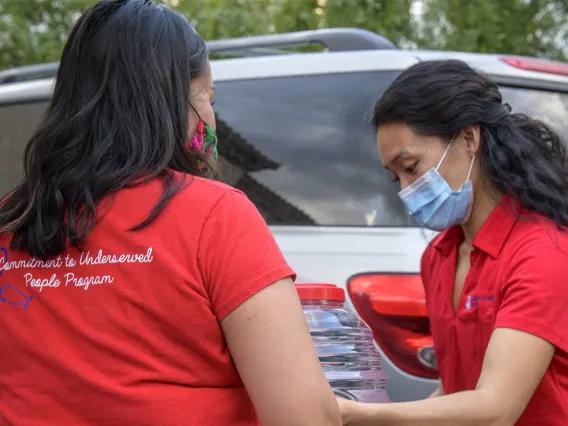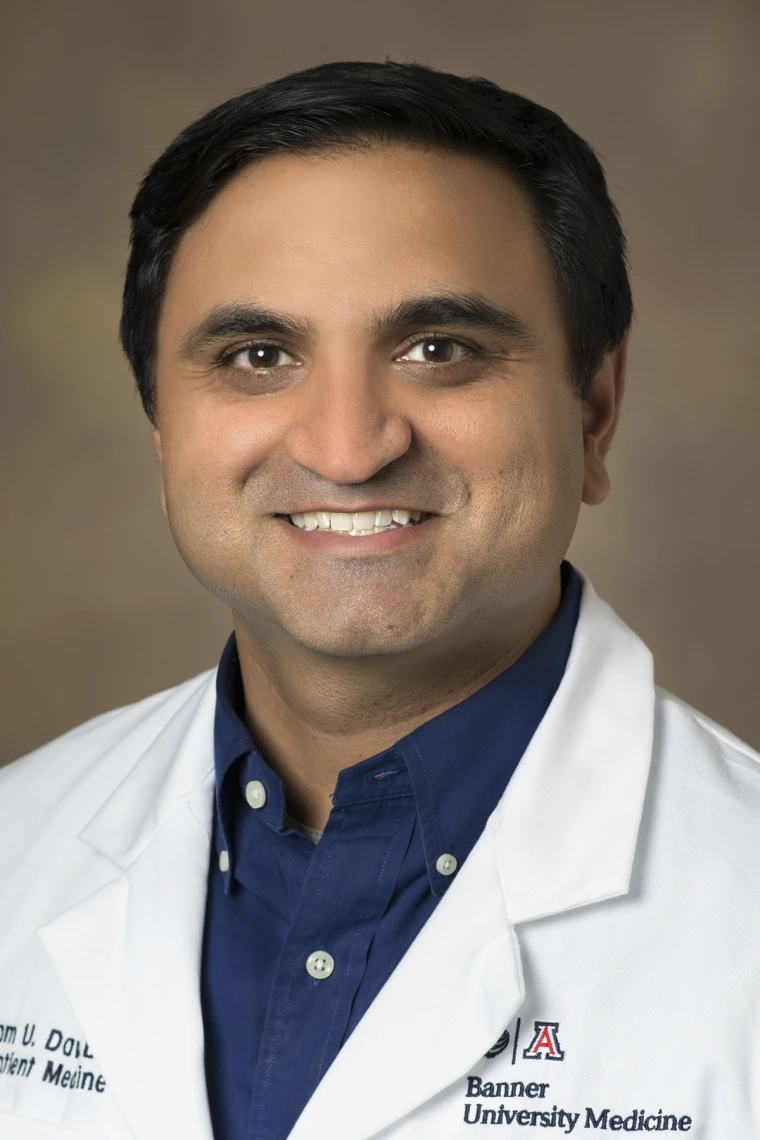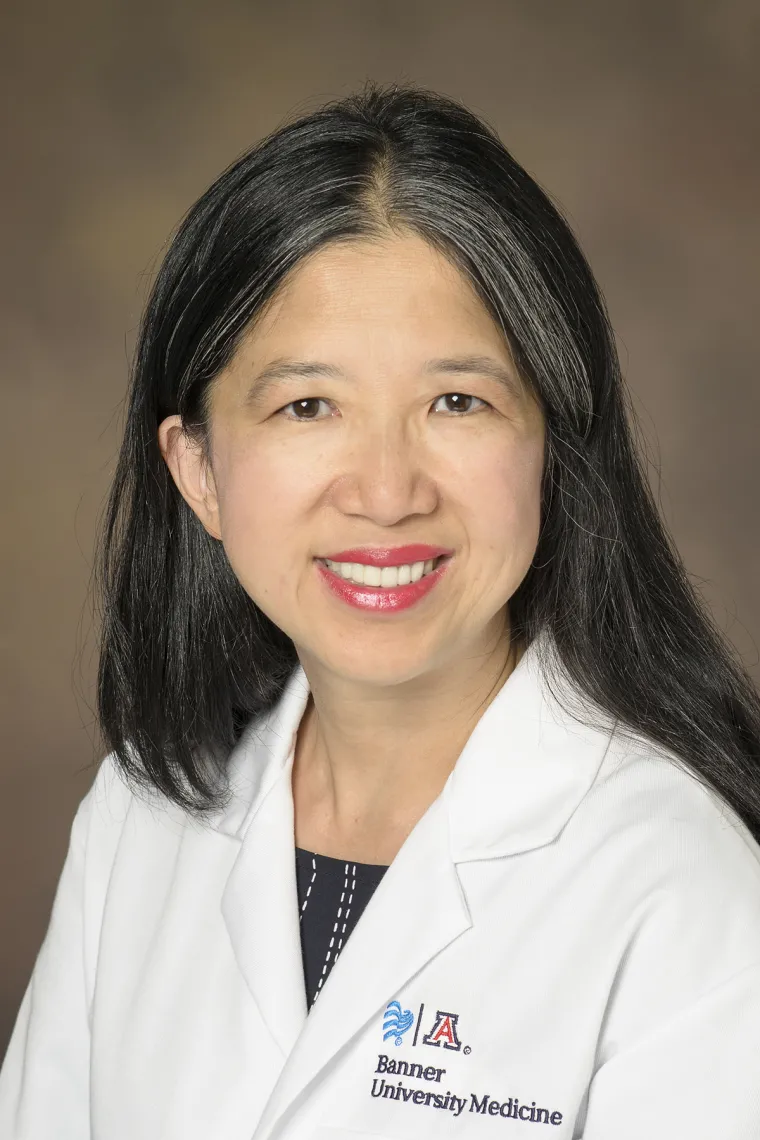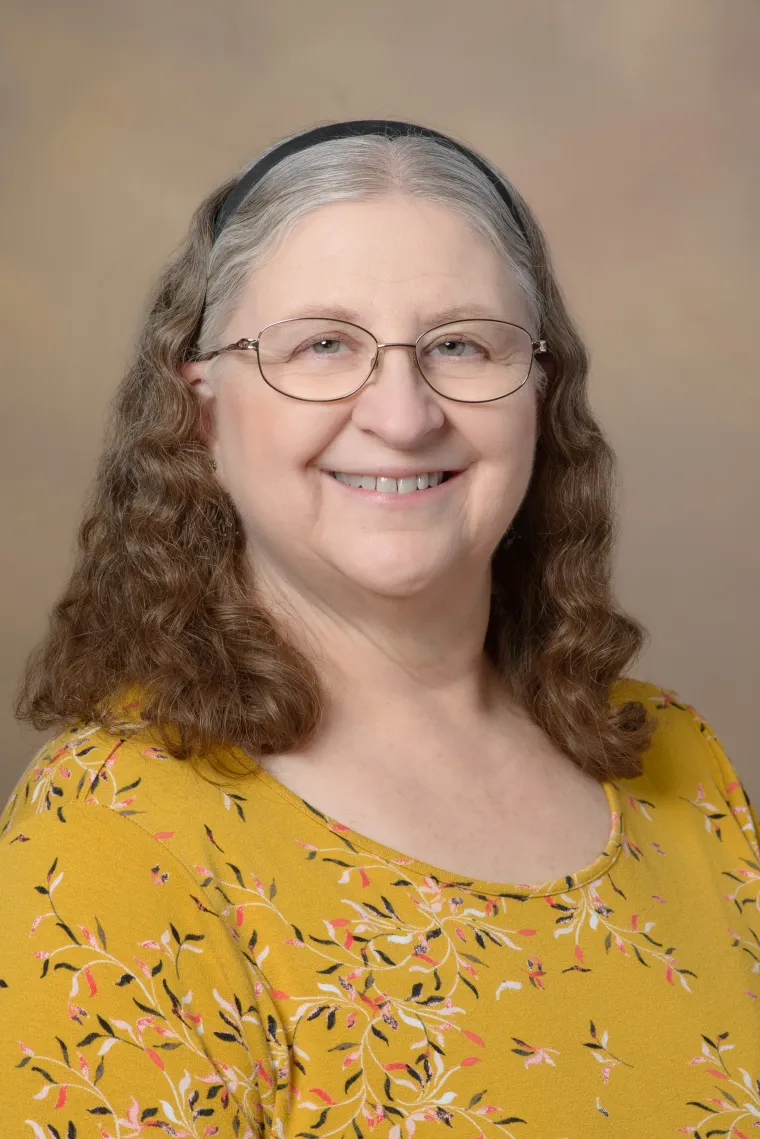About the Commitment to Underserved People (CUP) Program
The Commitment to Underserved People (CUP) program was created in 1979 by a small number of medical students under the encouragement of Dr. Steve Spencer, a faculty member in the Department of Family and Community Medicine. Dr. Spencer was a mentor for medical students who wanted their careers to include the care of the medically underserved. Founding students were particularly interested in being of service while still in medical school. Dr. Spencer assisted the students in developing the skills they would need to work with medically underserved populations.
From its modest beginnings with a single CUP clinic serving a sizeable refugee population, many of whom were political refugees from Central America, CUP has evolved into a substantial program in which, since 1996, over 90% of all students in the first two years of medical school participate. Participation in CUP helps students learn about community service and enables them to enhance their clinical and teaching skills. Through this work, they learn the impact of socioeconomic status on access to health care and the effect of culture on health.
For students to participate in CUP programs, clinical skill training is required of all students who volunteer at any program where clinical care is provided. This training includes an online module and “hands-on” training for vaccine administration (intradermal, subcutaneous and intramuscular), phlebotomy, vital signs and using the otoscope/ophthalmoscope. Additional training per program is required, providing the medical students with information on the population being served, the teaching materials (if applicable) and the procedures for participating in that specific program.
Students can earn elective credit through participation in CUP. Students who contribute 45-90 hours of service during pre-clerkship can earn 1-2 units of credit for the elective CUP I. Credit earned in CUP I is recorded on the student’s transcript, but may not be applied to meet graduation requirements. Similarly, students may earn 1-2 units of elective credit during their clerkship and transition-to-residency phases in CUP II. This credit may be applied to meet graduation requirements. To receive credit for CUP I or II, students must complete another 45-90 hours of service, enroll in the elective and submit a five-page reflective paper on their experiences in CUP. Students also may qualify to receive a notation of “Distinction in Community Service” noted on their transcript by contributing 90 hours of service in both CUP I and CUP II, and submitting a 10-page research paper on a topic related to underserved populations, tying in reflections from their CUP experiences, with appropriate citations from the literature.
Program Policies
A list of the current Commitment to Underserved People (CUP) program leaders.
The attendance policy for students in the Commitment to Underserved People (CUP) program, updated October 6, 2014.
This handbook includes the policies of the Commitment to Underserved People (CUP) Program and addresses:
• Goals/objectives
• Membership
• Requirements
• Elective credit
• Clinical and non-clinical programs
• The associated Distinction Track in Community Service
Clinics and Programs
Asylum Clinic
This clinic is held on an as-needed basis for torture victims seeking asylum. One physician, student and interpreter meet with the client to document torture, not for evaluation of physical illness. The Asylum Program of Arizona uses the medical affidavit as part of the court case seeking political asylum for the victim.
Integrative Medicine Clinic
Medical students work alongside integrative medicine-trained physicians and fellows to provide basic integrative medicine services, which include one-on-one consultations, acupuncture, mind-body groups and educational courses. Our aim is to improve our patients’ health and well-being by implementing evidence-based integrative medicine in an affordable and resourceful way.
Kids’ Clinic
The Kids’ Clinic helps make sure all children get the care they need. We serve uninsured kids from ages 0-18 years old, free of charge, with well-child visits, sports physicals and vaccines.
LGBTQ+ Clinic
Medical students will take histories and perform physical examinations under the supervision of volunteer attending physicians while providing a friendly and affirming point of entry for LGBTQ+ patients into the health care system, especially the uninsured and underinsured.
MIND Clinic
Medical students will participate in this free mental health clinic dedicated to treating the psychiatric needs of the underserved patients of Tucson as part of the mental health care team, alongside a psychiatrist, by assisting with taking histories and performing psychiatric evaluations to assess patients’ mental health needs and implement treatments.
Shubitz Family Clinic
Under the supervision of volunteer attending physicians, medical students coordinate and provide culturally appropriate preventive care, primary care, referrals and diagnostic tests to patients who have no other source of health care. Language interpretation is provided.
Sight Savers Clinic
Using ophthalmologic diagnostic equipment under the supervision of an ophthalmologist, medical students work in this free glaucoma screening clinic for underinsured and uninsured populations. This is part of a national program.
Vasectomy Clinic
Under the supervision of volunteer urologists, medical students coordinate and assist in providing free vasectomies to uninsured patients.
Women’s Clinic
In collaboration with Emerge! Center for Prevention of Domestic Violence, women and their children receive free preventive care, primary care, referrals and diagnostic tests by medical students under the supervision of volunteer attending physicians.
Wound Clinic
Under the supervision of volunteer physicians, this clinic will address the growing need for complex wound care in Tucson and will provide a procedural element for the CUP Clinics by providing care to patients with lacerations and those who require wound closures. This will also include continuity of care for these individuals.
Care Connections
Care Connections works to connect underserved clients to social resources around Tucson to improve their quality of life through sustainability.
Clinica Amistad
Medical students support this free nonprofit health clinic in South Tucson by taking vital signs, serving as medical interpreters to primary care providers, managing patient appointments, managing patient medications and assisting in various diagnostic tests.
Flying Samaritans
Medical students will travel with the Flying Samaritans Club to Agua Prieta, Mexico, once a month to run a free medical clinic for the community. Students will evaluate/triage patients, conduct health interviews, perform physical exams, and write and present SOAP notes under practitioner supervision.
Health for the Homeless
Health for the Homeless allows medical students to volunteer at an established clinic run by Tom Hill in downtown Tucson. This CUP program will provide students with a unique opportunity to understand the limitations the homeless population encounters in accessing and receiving health care.
Islamic Community Clinic
Medical students will work with attendings at the Muslim Community Center of Tucson to offer free and accessible health care to a community in Tucson that comprises refugees, uninsured individuals and persons who do not have access to culturally, linguistically and religiously competent health care.
MexZona – Rocky Point Medical Clinics
Medical students will perform HPI & physicals on patients alongside volunteer physicians, and possibly provide interpretation for physicians as well. The monthly three-day field trip must be registered in the UA International Travel Registry Notes by each student scheduled to attend.
Mobile Health Program
Medical students work with the Department of Family and Community Medicine’s mobile van, staffed by nurse practitioners and family physicians, providing prenatal and general health care at sites around underserved regions of Tucson and also at local health fairs.
Refugee Clinic
Medical students work with residents and physicians at the Banner – University Medicine South Campus to address the challenges that refugee patients face to attain sustainable, primary care services.
Street Medicine CUP Clinic – Tucson
Medical students will collaborate with undergraduates to observe the challenges the homeless population faces in accessing health care. This program will be a free nonprofit clinic that will focus on triage, basic laboratory testing, basic primary physical and mental health screening, basic wound care and referrals to other CUP Clinics.
AMWA Outreach Program
AMWA outreach holds preventive health events focused on women and children. This includes monthly preventive health workshops at Emerge! Center Against Domestic Abuse sites. Preventive health workshops provide education regarding stress management, diet and nutrition, health care access, women’s health, sexual health, and infant and child health.
Arizona Diabetes Initiative
ADI raises awareness and resources for those living with all types of diabetes, including their families and friends in Southern Arizona. Medical students will volunteer by learning through guest speakers, educating at local high schools and attending community events.
ArtWorks
Medical students are paired with developmentally disabled adults and participate in art and music to increase awareness of the social and medical issues faced by people with the developmental disability.
Christ the Good Shepherd Mission
A club geared toward serving the homeless/underserved communities, providing them with meals and other necessities.
Food RX
Students will assist with food box assembly and other volunteer roles at the Community Food Bank to better understand the workings of the food bank and connect with the health disparities that some patients live with.
JAWS/AAWS Adaptive Athletics
Medical students play competitive and recreational sports with children with disabilities involved in the JAWS (Juniors Active in Wheelchair Sports) program, promoting social interaction and healthy lifestyles and assisting students in understanding the resilience of these youth.
MedCat Companions
Medical students will provide companionship and engagement with patients at Banner UMC to combat feelings of loneliness, improve patient satisfaction and foster health care team-patient relationships. Students will not provide medical advice during visit.
MedPride
Students will participate in events that promote the health and wellness of the LBGTQ+ community through education and advocacy.
Med Teach
Middle school students in under-resourced schools learn about the anatomy, physiology and pathophysiology of the heart and/or eye while participating in dissections of sheep hearts and eyes under the instruction of medical students. Students also promote the importance of a science background in potential health careers.
Pima Juvenile Education Program
In collaboration with the Health Education Project at El Rio Health Center, medical students interact with both female and male low-risk detainees discussing various health topics at the Pima County Jail and at the Pima County Juvenile facility.
Respiratory Fit Team
Medical students are trained to provide respirator mask fit testing twice a year during transition to clerkship and intersessions 2. RHPP Students receive this training prior to their first summer rural rotations.
SHINE – Students Helping In-Need Elders
Medical students work in an inter-professional team to gain experience working with the elderly at St. Luke’s Home through clinical and real-life interactions. This program covers all aspects of care of the older adult, including clinical care, education and transitions of care.
Special Olympics Program
Medical students will pair with individuals who are participating in Special Olympics for mentoring. There will be lectures, research opportunities and events that medical students can partake in.
STAT – Students Together Against Trafficking
Students work with Sold No More and Streetlight USA to raise awareness of human trafficking in Tucson and other areas of Arizona by participating in education programs in local middle schools and at the college. Students will also provide support and mentorship to trafficking victims.
Sun Protection Outreach
Med students teach sun safety and skin cancer prevention to elementary school children, through interactive discussions and activities, using material from the EPA’s SunWise curriculum.
Teach4Kids
Medical students will partner with Teach4Kids, a nonprofit organization at Banner. Through this organization, medical students will teach science projects and lessons to hospitalized children so they can keep engaging with school material.
Team Hoyt Arizona
Students serve by supporting assisted athletes in endurance races, ranging in distance from 1k to 26.2 miles. In teams of two to four, students take turns guiding assisted athletes in strollers through the racecourse and across the finish line.
THE MAZE – Teen Healthcare Education and Mentorship, an AZ Effort
Medical students will provide mentorship to underrepresented and/or disadvantaged high school students attempting to navigate the proverbial “maze” of medical education by connecting the students with mentors in the medical field to assist in the process of applying to medical school or other careers in health care.
TREE – Tucson Refugee Education and Empowerment
Medical students will provide educational assistance to children and adults at their residence. They, in turn, teach the medical students about their culture as they welcome them into their home.
Tucson High/UA Mentorship Program
Medical students mentor Tucson High School students and pre-health undergraduates at the university from backgrounds that are traditionally underrepresented in medicine to encourage/support academic success and to expose these students to the health professions.
UA HOPE – Health Literacy, Outreach, Prevention, and Engagement
Medical students organize support groups, fundraisers, screening events, transportation and educational workshops to address the needs of underserved cancer patients and their families.
FAQs
No; however, we do require all students to review the CUP Online Clinical Skills Module prior to volunteering. The individual CUP Clinics will have trainings each year for new leaders. Many of the non-clinical programs offer trainings for their particular programs, too.
Yes. We ask that you pay a one-time fee of $20 to “join” CUP. The fee helps us pay for the costs of food and supplies for meetings, trainings and clinics. This allows us to use our budget to pay for supplies and medications needed to run the CUP programs.
Once you have joined CUP you will earn hours by volunteering for any of our more than 40 CUP programs. Most programs request volunteers via the medical student listservs so keep an eye out!
All CUP activities are voluntary and are not part of the required curriculum. If there is a conflict with scheduled curricular activities, such as required labs or small groups where your participation is expected, it is your responsibility as a medical student to attend the required activity. Therefore, it is important to check your schedules carefully before making a commitment to a specific CUP activity. Students should not expect that CUP participation is a valid excuse for missing a required activity — it will not be considered as such. The faculty is not responsible to provide remediation for you if you miss a class session.
Optional Elective Credit
There are two CUP electives: CUP I and CUP II. CUP I allows you to get either 1 or 2 units of non-graduation credit by participating in CUP during the first two years of medical school. CUP II allows you to get either 1 or 2 units of fourth-year graduation credit by participating in CUP during your third and fourth years. The minimum number of CUP hours for credit in either elective is 45 hours for 1 credit and 90 hours for 2 credits. The CUP I elective must be completed in order to get CUP II credit.
For CUP I, a student needs to complete the required hours and submit a three-page reflective paper to the CUP director, wherein a student will consider and reflect upon something they encountered during while participating during pre-clerkship. This paper is due prior to starting transition to clerkship.
CUP II is a program that will developmentally have different objectives since the student has gained more knowledge and skills during the ensuing years of their medical education. For CUP II another reflective paper is required, this one either three or five pages in length depending on if student has completed 45 or 90 hours with the same considerations for topics to reflect upon.
In order to earn distinction in Community Service (CSDT) the following requirements must be completed:
- Complete CUP I with 90 hours of volunteer time during pre-clerkship phase
- Hold a leadership position in one of the CUP clinical or educational programs
- Complete a three-page reflection paper on their experiences in CUP I
- Complete CUP II with another 90 hours of volunteer time during clerkship and transition to residency phases
- Submit MED-880C form with a detailed description of capstone project topic for approval before being enrolled in course
- Complete a community service capstone project. Students will be expected to meet with a designated mentor to discuss this project — this may be the CUP director or associate director or a community preceptor/mentor. This capstone project can fall into one of the following three categories:
- Research Paper: This should be a 10-page cited paper addressing a topic relevant to care for underserved populations. Students may choose to add a section in the discussion section reflecting on their personal experiences in the CUP program and how this will affect their future interactions as a physician and what these experiences have provided them in terms of insight and learning.
- Advocacy Article or Narrative Medicine Composition: Students will focus on a particular issue or patient experience which they use to write this piece, using their roles as future medical leaders to advocate for patient needs. This should be a high-level article that is publishable quality and students should plan to submit these to be published.
- Longitudinal QI project: These projects will be designed in conjunction with and approved by CUP director with mentorship throughout the transition to clerkship year. Students will complete a write-up of the data and outcomes of these projects for their capstone.
- Present the capstone project either at an end-of-year Presentation Day or at the college’s Research Day.
All capstone papers and projects are due no later than March 1 of the year the student graduates (or October 1 if the student is graduating in December).
As CUP evolves, so do the rules and requirements related to CUP programs. Medical school classes before or after yours may have different requirements.
The CUP programs are grouped into two categories: clinical and non-clinical.
The student leaders do! CUP is truly a student-developed, student-directed program. Student coordinators lead each CUP program. The responsibilities for many of these programs are shared by a number of students, particularly for programs that are complex in their operation.
New programs are developed by students and are based on their desire to work with a particular population, but must be approved by the distinction track director. Faculty and staff can help provide assistance, such as linkages to community agencies or leaders, and technical advice about program logistics, eligibility and feasibility as CUP has a limited budget.
Leadership changes every year. Each year, the leaders, who are now second-year students, recruit and train new leaders from the first-year class to take over the programs in the spring. If you are interested in a leadership role in one of the CUP programs, talk to the current leaders.
Contact Us







